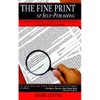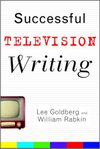
I firmly believe it’s a mistake to pay to have your book published by a vanity press and that it’s tantamount to flushing your money down a toilet. But if you are intent on doing it anyway, then you must read THE FINE PRINT OF SELF-PUBLISHING by Mark Levine first. He analyzes the major vanity presses and their contracts, their pluses and minuses, and gives you a thorough understanding of how that business works.
He starts by talking about how he chose the vanity press route for his first book:
"In 1994, when I finished the novel, I put it into the hands of a few big-time publishing houses. They all told me the same thing. ‘We like the writing, but in order for us to sell it, you have to rewrite this and rewrite that, then send it back to us.’ I wasn’t about to start rewriting my book so that maybe some traditional publisher would take it."
To me, that attitude pretty much sums up the problem with most of the writers who go the self-publishing route. He goes on to say his book was awarded ‘Book of the Year’ by the publisher he paid to publish his book, making it a dubious honor at best, and the fact that he’s proud of it, and touts it in his book, made me wonder about the guy and his credibilty (he claims that President Clinton read the book and that’s certainly worth touting). On the other hand, he recognizes that a vanity press publication is, at best, a small step towards becoming a publisher yourself or landing a traditi0nal publishing contract.
But Levine quickly won me over with his knowledge and professionalism in his approach towards his topic. Levine is obviously pro-vanity press, but even with that bias, he does a remarkably thorough job analyzing the companies and their practices, even singling out the worst offenders by name (Authorhouse and PublishAmerica among them) and detailing exactly what they are doing wrong, line by line, in their contracts. During the research phase of his book, he even succeeded in getting some publishers to adjust their contracts to be more author-friendly.
The book is breezily written and very informative. THE FINE PRINT OF SELF-PUBLISHING is a long overdue, much-needed book and is worth buying whether you’re contemplating self-publishing or not simply for the education Levine gives in how to read a publishing contract and understand the terms.


